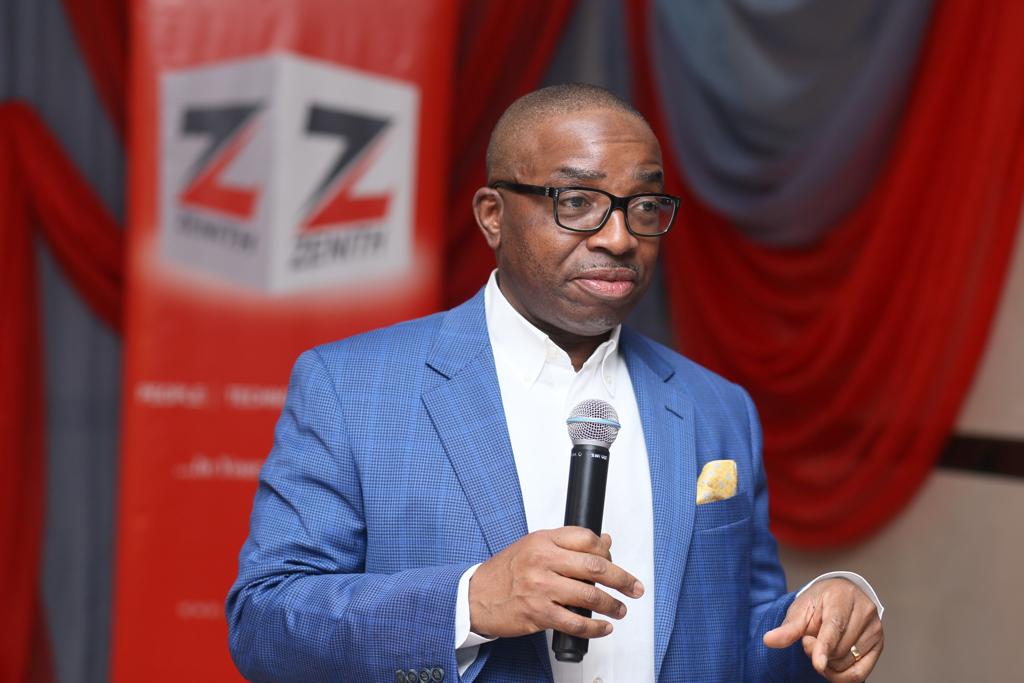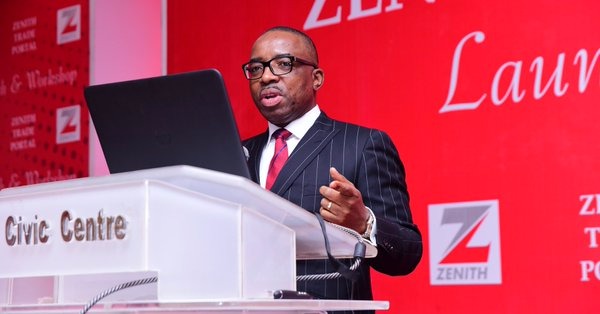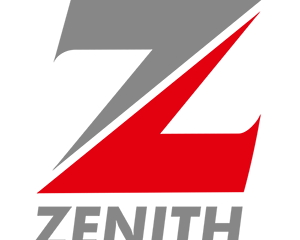Business
ZENITH BANK APPOINTS EBENEZER ONYEAGWU GMD/CEO EFFECTIVE JUNE I, 2019

Zenith Bank Plc. has announced the appointment of Mr. Ebenezer Onyeagwu as the Group Managing Director/CEO of the bank effective June 1, 2019, subject to the Central Bank of Nigeria (CBN) approval.
The appointment is consistent with the bank’s tradition and succession strategy of grooming leaders from within.
Onyeagwu replaces Mr. Peter Amangbo, whose tenure expires on May 31, 2019. Mr Amangbo leaves the bank at the end of a very successful career spanning over 27 years, with the last five years as GMD/CEO.
Mr. Ebenezer Onyeagwu is a vastly experienced banker and financial expert, trained in reputable institutions of learning in Nigeria, the United Kingdom and United States of America.
Mr. Onyeagwu is a graduate of Accounting from Auchi Polytechnic where he obtained the Ordinary National diploma in 1984 and Higher National Diploma in 1987. He qualified as a Chartered Accountant in 1989 while he was still undergoing the compulsory National Youth Service Corp (NYSC) post graduation and was named a Fellow of the Institute of Chartered Accountants of Nigeria (FCA) in 2003.
He is an alumnus of the prestigious University of Oxford, England, from where he obtained a Postgraduate Diploma in Financial Strategy, and certificate in Macroeconomics. He also undertook extensive executive level business education in Wharton Business School of the University of Pennsylvania, Columbia Business School of Columbia University, the Harvard Business School of Harvard University (all in the United States) and Lagos Business School of the Pan African University, Nigeria.
He has nearly 30 years’ experience in the banking industry in Nigeria. He joined Zenith Bank Plc in 2002 as a Senior Manager, in the Internal Control and Audit Group of the bank. His professionalism, competence, integrity and commitment to the set objectives of the bank saw him rise swiftly between 2003 and 2005, first, as Assistant General Manager, then Deputy General Manager, and eventually as General Manager of the bank. In these capacities, he handled strategies for new business and branch development, management of risk assets portfolios, treasury functions, strategic top level corporate, multinationals and public institutional relationships, among others.
As Deputy Managing Director, Mr. Onyeagwu has oversight over the bank’s Financial Control and Strategic Planning, Risk Management, Retail Banking, Institutional and Corporate banking business portfolios, IT Group, Credit Administration, Treasury and Foreign Exchange Trading, as well as general administration of the bank, among others.
He was named Executive Director of the bank in 2013, and put in charge of Lagos and South-South Zones as well as strategic groups/business units of the bank including Financial Control & Strategic Planning, Treasury and Correspondent Groups, Human Resources Group, Oil and Gas Group, and Credit Risk Management Group, etc. He was named Deputy Managing Director of the bank in 2016.
Mr. Onyeagwu has been on the board of Zenith Bank Ghana, Zenith Pensions Custodian Limited, Zenith Nominees Limited and African Finance Corporation (AFC) within the last six years. In AFC, he serves on the Board Risk & Investment Committee (BRIC) and Board Audit & Compliance Committee (BAAC). At Zenith Bank Ghana, he chairs the Board Credit and Governance Committees.
He brings to his job strategic thinking, inspirational leadership, energetic and entrepreneurial skills. He is married with children.

Business
Nigeria’s Inflation Drops to 15.10% as NBS Reports Deflationary Trend

Nigeria’s headline inflation rate declined to 15.10 per cent in January 2026, marking a significant drop from 27.61 per cent recorded in January 2025, according to the latest Consumer Price Index (CPI) report released by the National Bureau of Statistics.
The report also showed that month-on-month inflation recorded a deflationary trend of –2.88 per cent, representing a 3.42 percentage-point decrease compared to December 2025. Analysts say the development signals easing price pressures across key sectors of the economy.
Food inflation stood at 8.89 per cent year-on-year, down from 29.63 per cent in January 2025. On a month-on-month basis, food prices declined by 6.02 per cent, reflecting lower costs in several staple commodities.
The data suggests a sustained downward trajectory in inflation over the past 12 months, pointing to improving macroeconomic stability.
The administration of President Bola Ahmed Tinubu has consistently attributed recent economic adjustments to ongoing fiscal and monetary reforms aimed at stabilising prices, boosting agricultural output, and strengthening domestic supply chains.
Economic analysts note that while the latest figures indicate progress, sustaining the downward trend will depend on continued policy discipline, exchange rate stability, and improvements in food production and distribution.
The January report provides one of the clearest indications yet that inflationary pressures, which surged in early 2025, may be moderating.
Bank
Alpha Morgan to Host 19th Economic Review Webinar

Alpha Morgan to Host 19th Economic Review Webinar
In an economy shaped by constant shifts, the edge often belongs to those with the right information.
On Wednesday, February 25, 2026, Alpha Morgan Bank will host the 19th edition of its Economic Review Webinar, a high-level thought leadership session designed to equip businesses, investors, and individuals with timely financial and economic insight.
The session, which will hold live on Zoom at 10:00am WAT and will feature economist Bismarck Rewane, who will examine the key signals influencing Nigeria’s economic direction in 2026, including policy trends, market movements, and global developments shaping the local landscape.
With a consistent track record of delivering clarity in uncertain times, the Alpha Morgan Economic Review continues to provide practical context for decision-making in a dynamic environment.
Registration for the 19th Alpha Morgan Economic Review is free and can be completed via https://bit.ly/registeramerseries19
It is a bi-monthly platform that is open to the public and is held virtually.
Visit www.alphamorganbank to know more.
Business
GTBank Launches Quick Airtime Loan at 2.95%

GTBank Launches Quick Airtime Loan at 2.95%
Guaranty Trust Bank Ltd (GTBank), the flagship banking franchise of GTCO Plc, Africa’s leading financial services group, today announced the launch of Quick Airtime Loan, an innovative digital solution that gives customers instant access to airtime when they run out of call credit and have limited funds in their bank accounts, ensuring customers can stay connected when it matters most.
In today’s always-on world, running out of airtime is more than a minor inconvenience. It can mean missed opportunities, disrupted plans, and lost connections, often at the very moment when funds are tight, and options are limited. Quick Airtime Loan was created to solve this problem, offering customers instant access to airtime on credit, directly from their bank. With Quick Airtime Loan, eligible GTBank customers can access from ₦100 and up to ₦10,000 by dialing *737*90#. Available across all major mobile networks in Nigeria, the service will soon expand to include data loans, further strengthening its proposition as a reliable on-demand platform.
For years, the airtime credit market has been dominated by Telcos, where charges for this service are at 15%. GTBank is now changing the narrative by offering a customer-centric, bank-led digital alternative priced at 2.95%. Built on transparency, convenience and affordability, Quick Airtime Loan has the potential to broaden access to airtime, deliver meaningful cost savings for millions of Nigerians, and redefine how financial services show up in everyday life, not just in banking moments.
Commenting on the product launch, Miriam Olusanya, Managing Director of Guaranty Trust Bank Ltd, said: “Quick Airtime Loan reflects GTBank’s continued focus on delivering digital solutions that are relevant, accessible, and built around real customer needs. The solution underscores the power of a connected financial ecosystem, combining GTBank’s digital reach and lending expertise with the capabilities of HabariPay to deliver a smooth, end-to-end experience. By leveraging unique strengths across the Group, we are able to accelerate innovation, strengthen execution, and deliver a more integrated customer experience across all our service channels.”
Importantly, Quick Airtime Loan highlights GTCO’s evolution as a fully diversified financial services group. Leveraging HabariPay’s Squad, the solution reinforces the Group’s ecosystem proposition by bringing together banking, payment technology, and digital channels to deliver intuitive, one-stop experiences for customers.
With this new product launch, Guaranty Trust Bank is extending its legacy of pioneering digital-first solutions that have redefined customer access to financial services across the industry, building on the proven strength of its widely adopted QuickCredit offering and the convenience of the Bank’s iconic *737# USSD Banking platform.
About Guaranty Trust Bank
Guaranty Trust Bank (GTBank) is the flagship banking franchise of GTCO Plc, a leading financial services group with a strong presence across Africa and the United Kingdom. The Bank is widely recognized for its leadership in digital banking, customer experience, and innovative financial solutions that deliver value to individuals, businesses, and communities.
About HabariPay
HabariPay is the payments fintech subsidiary of GTCO Plc, focused on enabling fast, secure, and accessible digital payments for individuals and businesses. By integrating payments and digital technology, HabariPay supports innovative services that make everyday financial interactions simpler and more seamless.
Enquiries:
GTCO
Group Corporate Communication
[email protected]
+234-1-2715227
www.gtcoplc.com
-

 celebrity radar - gossips6 months ago
celebrity radar - gossips6 months agoWhy Babangida’s Hilltop Home Became Nigeria’s Political “Mecca”
-

 society6 months ago
society6 months agoPower is a Loan, Not a Possession: The Sacred Duty of Planting People
-

 society5 months ago
society5 months agoReligion: Africa’s Oldest Weapon of Enslavement and the Forgotten Truth
-

 news6 months ago
news6 months agoTHE APPOINTMENT OF WASIU AYINDE BY THE FEDERAL GOVERNMENT AS AN AMBASSADOR SOUNDS EMBARRASSING








You must be logged in to post a comment Login